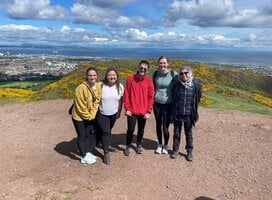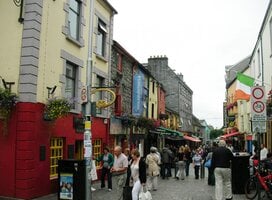Gap Year Programs in Scotland
Scotland is much more than its stereotypes of bagpipes, haggis, and kilts. Yes, you’ll still find all those here, but to truly discover the magic of the Highlands and Lowlands, consider spending a gap year in Scotland.
While in Scotland, you’ll experience what makes this country and its people unique. You’ll have the opportunity to hike through moors dotted with castles, rock out at one or more of the country’s epic music festivals, and turn acquaintances into friends at a traditional pub.
With English as the common language and amenities not too different from those in North America, you might expect Scotland to be very much like home, just with different scenery. While there, however, you’ll discover that the Scots have a unique and proud identity as complex and surprising as their fascinating country.
You'll find no shortage of opportunities and ideas for spending a fantastic gap year in Scotland. Whether you find work or find volunteer opportunities, or just spend your time hiking the moors and going to festivals, Scotland will keep you occupied in true Highland fashion.
Adventure travel/h4>
Scotland’s rugged and wild landscapes have been inspiring poets and visitors alike for centuries. What better place to get your boots muddy as you explore the glens and hills of Scotland’s wilderness. While traipsing around the countryside, you can climb Britain’s highest peak, Ben Nevis, and go spelunking in the moon-like caves of Staffa.
Intern
Scotland remains mostly rural, and there are a number of possibilities for working or interning in outdoor management. This might involve getting dirt under your fingernails as you work in one of the region’s horticultural initiatives, maintaining hiking trails, and monitoring wildlife.
Once the ice thaws in spring, people flock from near and far to take part in Scotland’s most famous sport -- golf. Many golf courses look for seasonal help, which may involve anything from maintaining the grounds, working in the pro shop, or waiting tables at the clubhouse.
Temp work agencies are a good way to search for work. These companies can help set you up in many different job sectors, such as media, advertising, and hospitality. One great thing about finding work this way is that the agency can be a great help in managing the complications of getting a visa as well as giving you the chance to meet other international people of a range of ages and backgrounds.
Volunteer
One great way to find volunteer placements in Scotland is at one of its many festivals. By volunteering your time, you’ll get free access to some of the most exciting events in the country. Festivals such as Edinburgh's yearly International Arts Festival, the Tartan Heart music festival, the Fringe Festival, or the Highland Games are always searching for eager volunteers to lend a hand.
There are also volunteer opportunities in wildlife and wilderness conservation efforts. While you probably won’t see Scotland’s national animal (the unicorn!) or the elusive Loch Ness Monster, you may cross paths with the seldom-seen Scottish wildcat or the comical but threatened western capercaillie. Your efforts will help ensure that these and other amazing creatures do not become absent from this mystical landscape.
Your experience in Scotland will depend a lot on where you base yourself. Scotland’s two main cities of Edinburgh and Glasgow have all the conveniences of a modern city yet are still small enough to feel quaint. Out in the countryside, you’ll have to be ready for rural living where simple errands may require a lengthy excursion.
Visas
Most visitors to Scotland and other parts of the UK can stay for up to six months visa-free as a tourist. If you are staying longer, you’ll need a visa. If you can find a job or a volunteer placement, getting a temporary work visa may be the best route to go. For this, you’ll need a certificate of sponsorship from a licensed employer. Allow up to three months for your visa to process.
<h4>Cost of Living in Scotland</h4>
<p>Scotland is a rather pricey country to spend your gap year. However, it can be less expensive than many other parts of the United Kingdom. Overall, Scotland is on par with, or perhaps slightly more expensive than many areas of the United States. Larger cities like Edinburgh and Glasgow tend to be a bit more expensive than smaller cities and towns.</p>
<p>There are ways to make your money go further though. Instead of driving your own car, take advantage of the region’s rather decent public transit, which consists of a combination of trains, buses, and ferries. Shop at budget grocery stores like Tesco and Lidl, cook at home more often than you eat out and take advantage of free attractions like parks and public museums.</p>
<p>The currency exchange might seem steep, but if you find a way to earn GBP, even if it’s only £5.50/hr, the costs become much more palatable.</p>
<h4>Housing in Scotland</h4>
<p>Scotland’s cities have no shortage of apartments (flats) for rent. Many landlords are willing to rent month-to-month instead of requiring a year-long lease. This is especially the case in areas near the major universities that cater mostly to students. Some landlords will require you to have a visa before they rent to you.</p>
<p>Expect to pay between £650 and £900 a month for a basic one-bedroom or studio in a city. Rental rates will be marginally less in smaller towns. Of course, you can cut housing costs significantly by having a roommate.</p>
<p>Once you have an official address and proof of residency, you can start taking advantage of local services, like getting a library card and health care through the National Health Service (NHS).</p>

















